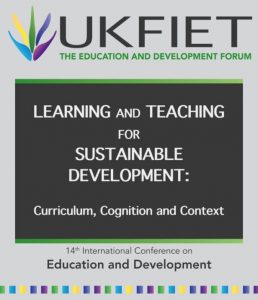Learning and Teaching for Sustainable Development – Curriculum, Cognition and Context
 What is taught and learned form the backbone of education’s contribution to sustainable development. It is through the construction of curricula that knowledge, skills, attitudes and values are prioritised and become the basis for teaching. Such prioritisations of what should be taught and learned are always political, as well as technical and professional. Crucial here too is the rise of attention to what individuals and communities value in terms of a set of capabilities and practices that for them define sustainable development. But, international education policy debates in this millennium have been dominated by access and, more recently, quality issues, without sufficient attention to questions of what is and might be learned and taught, and how. Such debates are timely not only because new understandings of learning are emerging, but also because the settings in which learning and teaching occur are deeply influential.
What is taught and learned form the backbone of education’s contribution to sustainable development. It is through the construction of curricula that knowledge, skills, attitudes and values are prioritised and become the basis for teaching. Such prioritisations of what should be taught and learned are always political, as well as technical and professional. Crucial here too is the rise of attention to what individuals and communities value in terms of a set of capabilities and practices that for them define sustainable development. But, international education policy debates in this millennium have been dominated by access and, more recently, quality issues, without sufficient attention to questions of what is and might be learned and taught, and how. Such debates are timely not only because new understandings of learning are emerging, but also because the settings in which learning and teaching occur are deeply influential.
The global context is significant in setting the agenda. The recent period up to 2015 saw a focus on a ‘learning crisis’ and the realisation that the challenge was not simply to get children into schools but to ensure that they learn more effectively. The adoption of the Sustainable Development Goals (SDGs) brings a new insistence on these broader challenges. SDG4 insists on equity, quality and inclusion of lifelong learning, not just schooling, and in all settings, not just low-income contexts. Both SDG4 and the wider set of 17 SDGs, moreover, raise new questions about what different actors think should be learned across all levels and modes of lifelong learning, about a wide range of aspects of life, from energy and water use to promoting peace and gender equality.
A revisiting of the education curriculum is simultaneously a revisiting of education’s purposes. We assume that educational development should: provide all citizens with basic competencies and the opportunity to learn more; reduce inequalities between students and between countries; and encourage attitudes and values that promote greater tolerance and peaceful relations. However, the detail of responses to these imperatives will vary across locations and between different levels of education. For instance, it is important to consider what they mean in adult education contexts, as well as in primary or secondary schooling. Moreover, such questions need to be framed in relation to goals for:
- social development that balances equity with incentive, rights with obligations, re-distributive contributions with safety nets, and reshapes the preferences of adults and children to live within planetary boundaries and eschew conflict, and provides for universal basic needs;
- political economy that values the future over the present, promotes tolerance and co-existence, contests destructive ideology, and offers constructive pathways towards responsible participation and viable economic strategies;
- economic policy that responsibly manages production, consumption and employment, redistributes income and benefits, and creates more investment in well-being and for public services free at the point of use; and
- science and technology that transforms health, agricultural and industrial productivity, clean energy production, and the ability to respond to social wants and needs.
